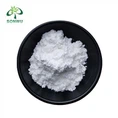Hydruobenzole hydrochloride powder is also called hydroxazole hydrochloride powder. Hydroxazole hydrochloride powder is an organic compound with the chemical formula C14H13ClN2O. It is an antiviral drug mainly used to treat acute epidemic hemorrhagic conjunctivitis. Hydrobenzole, or hydrobenzole hydrochloride, is a chemical usually used in hydrochloric acid and primarily used to treat acute epidemic hemorrhagic keratoconjunctivitis. Applicable to acute epidemic hemorrhagic conjunctivitis. It is used for epidemic hemorrhagic conjunctivitis (i.e., pink eye) and can also be used for other viral keratitis, conjunctivitis, and bacterial conjunctivitis. Clinical application is practical quickly and has no obvious irritation to the eye mucosa.

Pharmacological Action
Anti-microRNA virus drug. It inhibits human enterovirus, coxsackievirus, poliovirus, and "red eye virus." It can selectively inhibit microRNA virus polymerase in infected cells. In tissue culture, 50μg/ml of this product can effectively inhibit multiple strains of human enterovirus, coxsackievirus, and poliovirus. In tissue culture in Henan and Shanghai, this product (10μg/ml) can inhibit acute epidemic hemorrhagic conjunctivitis (commonly known as "red eye") virus (Shanghai-17 strain). This strain is a hydroxybenzyl derivative of benzimidazole, which can inhibit RNA polymerase inside infected cells, thereby inhibiting RNA synthesis. It has a significant inhibitory effect on epidemic hemorrhagic conjunctivitis virus.

Pharmacology And Toxicology
This product can selectively inhibit the microRNA virus polymerase of infected cells. In tissue culture, this product 50μg/ml can effectively inhibit multiple strains of human enterovirus, Coxsackie virus, and poliovirus; this product 10μg/ml can inhibit acute epidemic hemorrhagic tuberculosis and keratitis (commonly known as "red eye") virus (Shanghai-17 strain) (a microRNA virus). The mechanism of action of this product against microRNA viruses is generally believed to be to inhibit the RNA polymerase dependent on the virus coding in the infected cells so that the synthesis of viral RNA is blocked, thereby playing an inhibitory role in the virus.

What Is Hydruobenzole Hydrochloride Used For
Hydruobenzole hydrochloride is mainly used to relieve nasal and eye congestion. The specific uses are as follows:
A. Nasal decongestant
Uses:
1. Relieve nasal congestion: frequently used to treat sinusitis, allergic rhinitis, and common cold-related nasal congestion.
2. Relieve nasal congestion by constricting the blood vessels in the nasal cavity, reducing swelling and congestion, and improving breathing.
How to use:
Usually used as a nasal spray or drops, a single use can provide up to 12 hours of relief. It is recommended to use at most 2-3 times a day, and it should only be used continuously for three days to avoid rebound congestion.

B. Eye decongestant
Uses:
1. Relieve eye congestion: used to relieve eye redness and congestion caused by allergies, irritation, or fatigue.
2. Relieve eye discomfort: constricting the blood vessels in the eyes can relieve eye discomfort and redness.
How to use:
Usually used as eye drops, 1-2 drops each time, 2-4 times a day, but it should not be used for long to avoid rebound congestion or other adverse reactions.
Contraindications Of Hydroxybenzone
Hydruobenzole hydrochloride is generally contraindicated in the following cases:
1. Allergy to hydruobenzole hydrochloride: If the patient has an allergic reaction to hydruobenzole hydrochloride or its ingredients, this drug may cause severe allergic reactions, so it should be avoided.
2. Severe cardiovascular diseases: For patients with severe hypertension, coronary heart disease, etc., hydruobenzole hydrochloride can cause vasoconstriction and may hurt the cardiovascular system, so it should be avoided.
3. Hyperthyroidism: Because hydruobenzole hydrochloride can cause vasoconstriction and increase metabolic rate, it may aggravate the condition of patients with hyperthyroidism, so it should be used cautiously or avoided.
4. Angle-closure glaucoma is an eye disease with a sharp increase in intraocular pressure. Hydruobenzole hydrochloride may cause pupil dilation and affect intraocular pressure, which may aggravate the symptoms of angle-closure glaucoma, so it should be avoided.

5. Use of monoamine oxidase inhibitors (MAOI): During the use of MAOI antidepressants, hydruobenzole hydrochloride should not be used at the same time because the combined use of the two may increase the risk of high blood pressure.
6. Children: The safety and effectiveness of hydruobenzole hydrochloride have not been determined in children under 12, so it is not recommended for patients in this age group.
7. Pregnant and lactating women: The safety of pregnant or lactating women has not been entirely determined, so it should be used under the guidance of a doctor and weigh the pros and cons.
The above are common contraindications of hydruobenzole hydrochloride. Especially for people with underlying health issues, please be sure to consult with your physician or pharmacist before using this medication.
If you want to know more about the hydruobenzole hydrochloride manufacturer, you can contact Xi'an Sonwu. Click the email to get a high-quality hydroxazole hydrochloride powder.
Email: sales@sonwu.com





